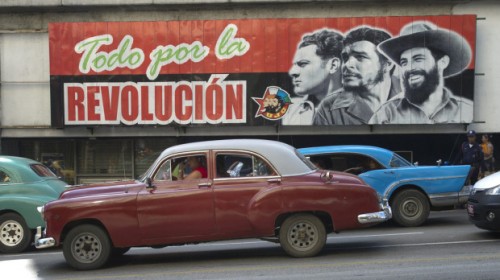Privatization of the Cuban Cab Industry
March 24, 2012 by admin
I’m not quite sure where our fascination with the vintage comes from. Maybe it’s the sentimentality or the thought that everyone wants it and nobody can have it. Maybe it’s the idea of looking forward through the window of the past. Either way, the vintage cars in Cuba, with their bright colors and beautiful design, captured my little aesthete heart.
The ’57 Chevy Bel Air we took coming back from Teatro Bertold Brecht one of our nights out in Havana had a sticky floor, lacked paneling on its ceiling, and had windows that no longer rolled down. It wasn’t as well maintained as some of the government taxis we spotted nearby, but its rustic charm won us over in the end.
 I spoke to the driver of our cab, a middle aged man named Orlando, and asked him various questions about recent steps towards the privatization of Cuba’s cab industry.The streets of many touristic cities are lined with both public and private taxi competition, which ,Orlando says, has increased dramatically in the past decade. He told me that him and many of his cab driver friends use driving a private vehicle as a means to supplement their meager government incomes from other jobs.
I spoke to the driver of our cab, a middle aged man named Orlando, and asked him various questions about recent steps towards the privatization of Cuba’s cab industry.The streets of many touristic cities are lined with both public and private taxi competition, which ,Orlando says, has increased dramatically in the past decade. He told me that him and many of his cab driver friends use driving a private vehicle as a means to supplement their meager government incomes from other jobs.
Perhaps another reason for the influx in cab drivers in recent years is Cuba’s gradual shift to revive its struggling economy.
In 2008, Cuba approved new licenses for private taxis, creating an alternative to the elite government fleet of taxis, which are all too expensive for everyday Cubans[1]. The public taxi drivers are initially provided with a vehicle by the government, but they must pay a high daily charge. Apparently, many Cubans already use private vehicles to give black market rides. They risk steep fines and even possible confiscation of their car by the state if caught. But the Cuban labor federation announced plans to cut one million public sector jobs, a number sure to increase in the years to come.[3] Is profiting from these black-market rides justified if its likely that many individuals will lose their public sector jobs in the near future?
The privatization of sectors of the cab industry is one of the few economic reforms President Raúl Castro has taken in his steps to create a more economically efficient Cuba. This law was created in stark contrast to Fidel’s ideals. He saw the private cab industry as reaping profit off of Cuba’s hard earned state subsidized gasoline prices.
Cuba also recently instated a law that gives permission to Cubans to freely engage in the buying and selling of cars. [2] Is this small free-market type opening in Cuba’s economy aligned with the original goals of the revolution?
After speaking with the cab drivers in Cuba, it surely doesn’t seem like the type of career someone could get very wealthy off of. The heightened competition, not only with the number of public taxis catering to tourists but also with the increasing number of private cab licenses and black market cabs put into operation, makes it seem as if the average cab driver serves to earn roughly $10-$15 a month after taxes and maintenance charges. Though this will amount to an income gap of sorts, it doesn’t seem significant enough to garner a concentration of wealth into the hands of a few.
What it does stand to illustrate though, is the gradual shift of Cuban ideals and the reappropriation of the goals of the revolution. This small act of privatization demonstrates how contemporary Cuba seeks to create greater market freedom to combat the transportation, food, and housing shortages that arose during the years of the Special Period.
[1] Chang, Richard S. “Cuba Ends Ban on Private Taxis.” Wheels Blog. NY Times, 11 July 2008. Web. 24 Mar. 2012. <http://wheels.blogs.nytimes.com/2008/07/11/cuba-ends-ban-on-private-taxis/>.
[2] Acosta, Nelson, and Jeff Franks. “Cuba Gives Green Light to Buying, Selling Cars.”Reuters. Thomson Reuters, 29 Sept. 2011. Web. 24 Mar. 2012. <http://www.reuters.com/article/2011/09/29/uk-cuba-cars-idUSLNE78S01I20110929>.
[3] “Cuba to Cut One Million Public Sector Jobs.” BBC News. BBC, 14 Sept. 2010. Web. 24 Mar. 2012. <http://www.bbc.co.uk/news/world-latin-america-11291267>.
Leave a Reply
You must be logged in to post a comment.

